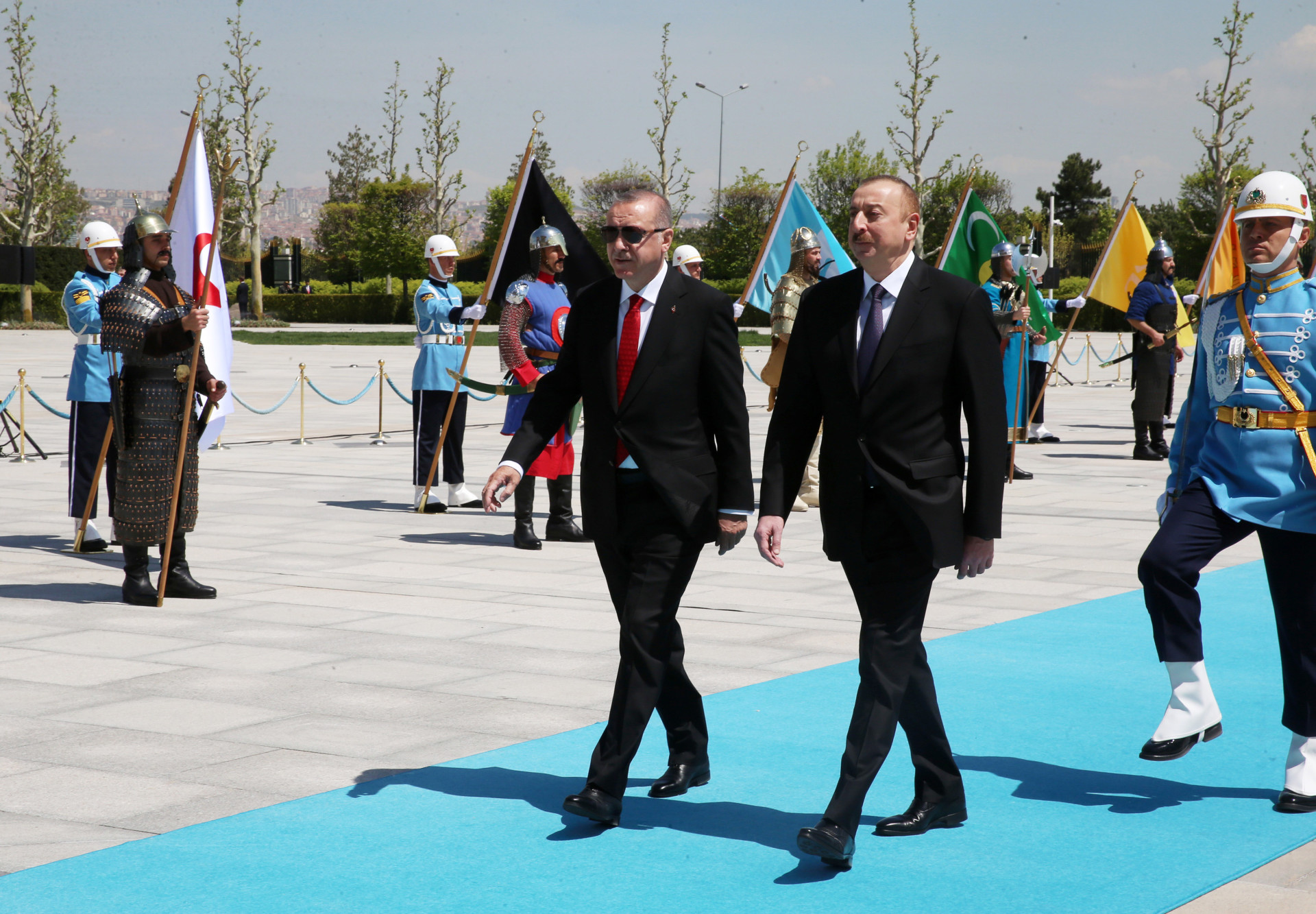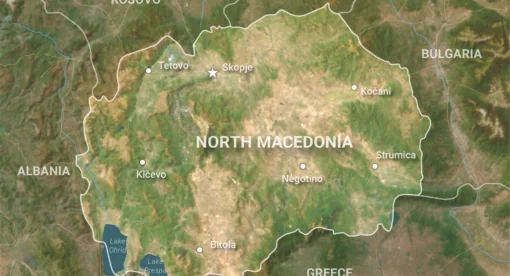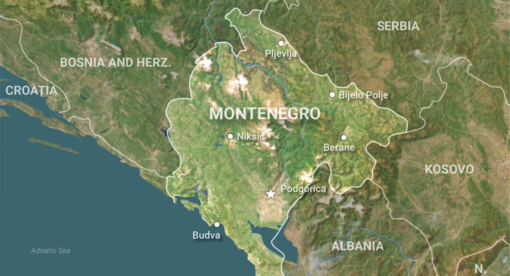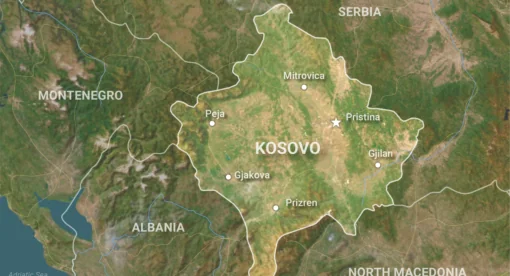Fresh off of playing a crucial role in supporting Azerbaijan’s decisive military victory over Armenia in the Nagorno-Karabakh conflict, Turkey is already consolidating its gains and setting its gaze further eastward.
Turkish Foreign Minister Mevlut Cavusoglu hosted his counterparts from Azerbaijan and Turkmenistan in Ankara on Feb. 23 to discuss cooperation initiatives between the three countries. Cavusoglu said during a joint press conference that “We are ready to do everything that depends on us in order to deliver gas from Turkmenistan to Turkey and further to Europe.”
That Turkey is following up on Azerbaijan’s military success by courting Turkmenistan’s energy resources is no coincidence. Azerbaijan’s territorial gains in Nagorno-Karabakh have the potential to unlock a number of infrastructure and energy connectivity projects via the Caucasus and Central Asia, with Turkey serving to benefit as both a destination and a strategic transit state for such projects while it pursues a more assertive foreign policy throughout its periphery. Ankara will face numerous challenges to seeing this potential fully materialized, but the current geopolitical climate offers a unique opportunity to build on its momentum, particularly as its interests in the Caucasus and Central Asia coincide with those of the U.S.
A Shifting Geopolitical Landscape
The recent conflict in Nagorno-Karabakh has led to important shifts in the geopolitical landscape of the Caucasus region and well beyond. Following decades of inconclusive talks after the initial conflict between Azerbaijan and Armenia from 1988 to 1994, Baku undertook a major military offensive in late September 2020 that enabled it to reclaim substantial territories in and around Nagorno-Karabakh that were previously under Armenian control. Turkey played a key role in Azerbaijan’s victory, providing Baku with significant political and security support, including the use of game-changing Turkish drones and the reported facilitation of mercenaries from the Syrian civil war.
This enhanced Turkish role also translated to substantial diplomatic leverage for Ankara. While Russia served as the primary mediator in the conflict and negotiated the cease-fire agreement that ended hostilities in early November, it did so having to seriously take Turkey’s interests into account. Though Russia gained a more direct foothold in the region with the deployment of 2,000 Russian peacekeepers, the conflicting parties also agreed to the establishment of a joint Turkish-Russian monitoring center to enforce the cease-fire. Ankara and Baku also have been involved in bilateral negotiations, outside of the Turkish-Russian monitoring center, about boosting the Turkish military presence in Azerbaijan.
Immediately after its victory, Azerbaijan launched an ambitious infrastructure development program for the region. In a joint meeting in January with Russian President Vladimir Putin and Armenian Prime Minister Nikol Pashinyan, Azerbaijani President Ilham Aliyev announced the creation of a working group to plan economic and infrastructure projects throughout the region. This includes the construction of a new road connecting Azerbaijan to its exclave, Nakhchivan, and further on to Turkey, as well as a new international airport in the Fizuli region.
For Turkey, such projects are highly welcome, as the conflict in Nagorno-Karabakh has long served as an economic impediment for Ankara. As part of its political backing of Azerbaijan in the Nagorno-Karabakh conflict, Turkey had closed its borders with Armenia, with Ankara making the resumption of diplomatic relations and trade ties conditional upon Yerevan’s relinquishment of territory to Baku. Turkey’s trade with Azerbaijan has thus gone primarily through Georgia, which serves as the sole transit state for crucial energy projects such as the BTC oil pipeline and BTE natural gas pipeline as part of the “Southern Corridor” route. Now, the inclusion of both Nagorno-Karabakh and Armenia in infrastructure and transit projects could unlock significant economic potential for Turkey in the Caucasus.
But Turkey’s ambitions don’t end there. A greater opening of the Caucasus also opens the door across the Caspian Sea to Central Asia, which has significantly larger volumes of energy than does Azerbaijan. Turkmenistan is particularly attractive for Turkey in this regard, holding the fourth-largest natural gas reserves in the world. Turkmenistan currently sends the vast majority of its natural gas exports eastward to China, with significant capacity for sending additional quantities of its energy supplies westward to Turkey and on to Europe.
With a reconfigured landscape in the Caucasus and the necessary infrastructure development, Turkmenistan’s natural gas exports could provide a significant economic boon for Ankara while enabling Turkey to become a central connecting point between the Caucasus, Central Asia, Europe, and the Mediterranean basin. This would enable Turkey to further diversify away from its energy dependency on Russia, which could in turn translate to a more emboldened and independent foreign policy.
Turkey can further diversify away from its energy dependency on Russia, which could in turn translate to a more emboldened and independent foreign policy.
Potential Stumbling Blocks
Several factors could complicate Turkey’s grand plans in the region. The first and most immediate concern is the sustainability of the cease-fire between Armenia and Azerbaijan. In the wake of the agreement, the political situation in Armenia has become highly volatile. Pashinyan came under significant pressure from protesters and leading political and military officials to resign and hold early elections — pressure he finally succumbed to on March 18 when he announced that elections would be held June 20. A change of government in Armenia could lead to a resumption of hostilities and threaten any progress toward infrastructure development in the region, though Russia’s presence will serve as a check on major military action by any of the involved parties.
Another concern is the viability of connecting Turkmenistan’s natural gas supplies to Azerbaijan across the Caspian Sea. While such a project would be relatively easy to construct from a technical perspective (requiring only 186 miles of pipeline at a projected cost of less than $1.8 billion), it would be a greater challenge from a political perspective. Indeed, the construction of a Trans-Caspian pipeline has been discussed for decades, but progress has been stymied by legal and maritime disputes between the Caspian littoral states, which include Russia, Iran, and Kazakhstan in addition to Azerbaijan and Turkmenistan. Russia and Iran have especially bristled at the pipeline, seeing it as a potential rival to their own energy exports.
However, much political and legal groundwork has been laid in recent years to resolve disputes among the Caspian Sea littoral states. A landmark agreement was reached in August 2018 in which the five littoral states signed the Convention on the Legal Status of the Caspian Sea, defining its legal status and establishing a formula to divide its resources. This allows individual countries to reach agreements on the construction of subsea pipelines between them, rather than needing the formal approval of all five (as a concession to Russia and Iran, any military presence in the Caspian Sea from countries other than the littoral states was banned). Subsequently, in January of this year Azerbaijan and Turkmenistan reached their own bilateral agreement allowing for joint exploration and development in the Dostluk offshore block in the Caspian Sea.
Beyond the legal and technical issues, Russia remains the biggest challenge to Turkey’s plans in the Caucasus and Central Asia. Moscow is still the primary player in both regions and has the power – whether diplomatic or military – to act as spoiler to any major initiatives taken there. Nevertheless, Turkey has proven its ability to work with Russia even in contested theaters, as can be seen in the countries’ cooperation in Syria despite being on opposing sides of the conflict, and more recently in Nagorno-Karabakh.
Turkey has proven its ability to work with Russia even in contested theaters, as can be seen in the countries’ cooperation in Syria despite being on opposing sides of the conflict, and more recently in Nagorno-Karabakh.
In part, this is because of their own substantial bilateral ties, with Turkey serving as a major importer of Russian natural gas and as a market for Russian arms sales, including S-400s. But this is also because Turkey has muscled its way into these theaters such as Libya in recent years and increased its own power and influence, giving Moscow little choice but to negotiate. In this context, Russian opposition to a Trans-Caspian pipeline is no longer a proven obstacle for Turkey but rather a challenge to maneuver carefully.
The U.S. Factor
Thus, if Turkey is to achieve its grand plans of serving as a focal point in integration between the Caucasus, Central Asia, and Europe, it will require Ankara to carefully navigate around numerous obstacles. One player that could be of substantial help to Turkey is the United States. While the U.S. does not have a direct presence in the Caucasus and Central Asia, it does have important overlapping interests with Turkey in these regions and leverage it can bring to bear.
One key shared interest between the U.S. and Turkey is the development of the Southern Corridor, particularly when it comes to the energy sphere. The U.S. has long sought to support projects that could allow Europe to diversify away from Russia’s strong energy grip on the continent, serving as a key financial and technical backer of the BTC and BTE pipelines in the 1990s and early 2000s. The U.S. could play a similar role in providing economic and diplomatic weight to help Turkey see the Trans-Caspian pipeline through. The U.S. could also help stabilize the political situation in Armenia and emphasize the economic opportunities of regional integration for Yerevan via an influential Armenian lobby in Washington.
From the U.S. perspective, supporting Turkey in its efforts would not only serve as a check to Russia’s influence in the Caucasus and Central Asia but could also temper any further alignment between Ankara and Moscow and help mitigate future conflicts in the Caucasus. Thus, while many challenges lie ahead for Turkey and the U.S. in such efforts, the recent shifts in the Eurasian theater offer substantial opportunities for both countries that are difficult to ignore.
Eugene Chausovsky is a Nonresident Fellow with the Newlines Institute. Previously, he served as Senior Eurasia Analyst at Stratfor for 10 years. His work focuses on political, economic, and security issues pertaining to the former Soviet Union, Europe, and Latin America. He Tweets at @EugeneChausovsk.
The views expressed in this article are those of the author and not an official policy or position of the Newlines Institute.







